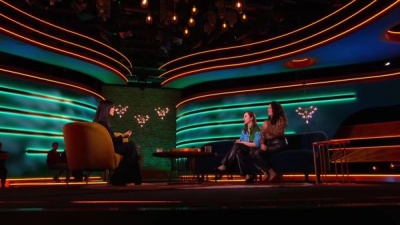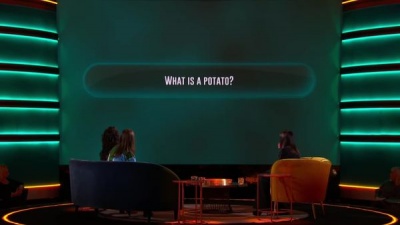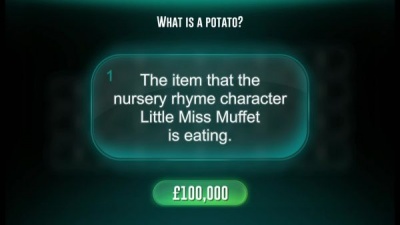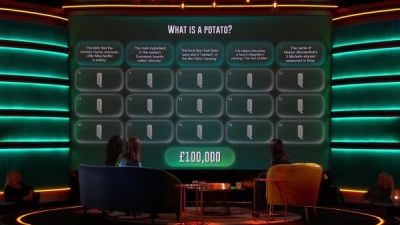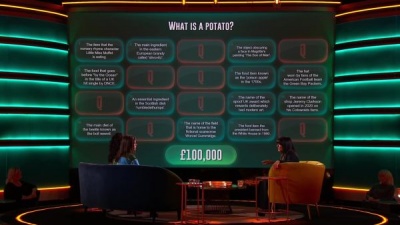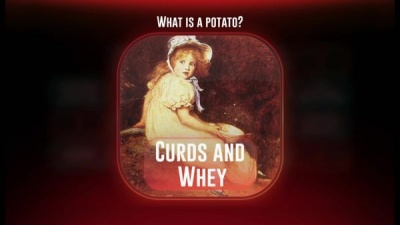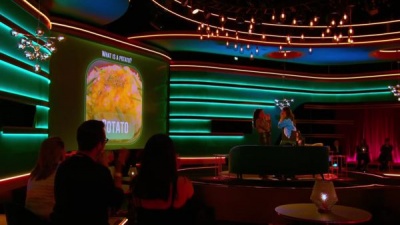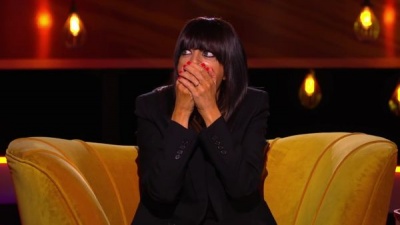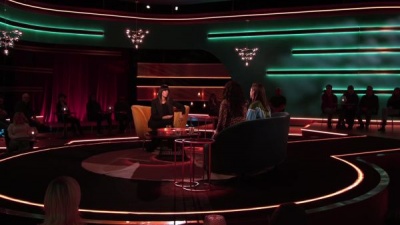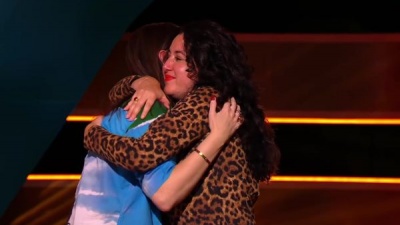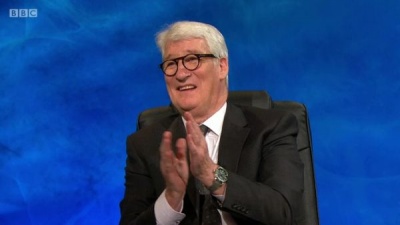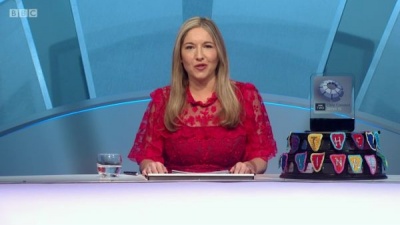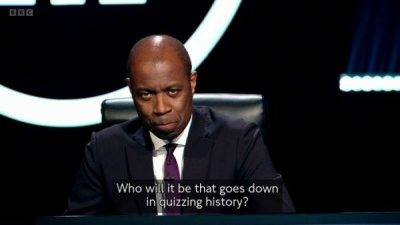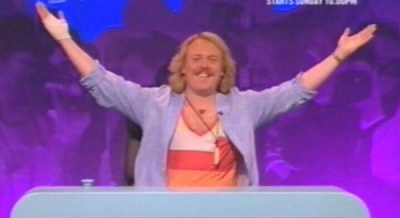Weaver's Week 2022-07-10
Last week | Weaver's Week Index | Next week
"Possibly the most stupidly easy way to win thousands of pounds ever created,” according to host Claudia Winkleman.
Contents |
One Question
Chalkboard and Motion Content Group for Channel 4, from 24 June
The premise is incredibly simple. One question. Twenty possible answers. One hundred thousand pounds. Which single answer is correct, and will unlock the money?
The execution is not much more complex. Our contestant couple walks on, plonk themselves down on the One Question sofa. It's always been couples, never a threesome, never a solo player.
Claudia talks to the players, who they are, where they're from, what they do, how they know each other, what they had for dinner last night. That sort of gentle chit-chat, put the players at their ease. Then Claudia asks the titular One Question. For instance,
One by one, twenty possible answers will appear. They're not completely transparent answers, but clues to other things. For instance, "The item that the nursery rhyme character Little Miss Muffet is eating".
Do we know what Little Miss Muffet ate? Curds and whey, wasn't it? So no, that's not potato.
The first part of the show opens up five of the answers. Once they've seen all five, the contestants are encouraged to reject two of them. Each answer is displayed on screen, and explained as to why it's wrong. Heston Bloomingheck's restaurant, that's not A Potato, it's The Fat Duck.
Wrong answers turn red, with a pleasant "ding!". If we ever reject the right answer, it turns a greeny green, with an unhelpful windy sound.
Rinse and repeat this for more sets of five, until all twenty answers have been exposed. One of them is the correct answer, and if the contestants are secure enough to say it, they can end the game right now. £100,000 and an entry in the quiz hall of fame if they're right, £0 and a trip back to the green room if they're wrong. Unsurprisingly, we've yet to see anyone say, "Yes, that's a potato" so early in the show.
Once the players have made the first pass through the grid, they'll be down to a dozen answers. They can continue to eliminate clues they know to be wrong, this won't alter their score.
Or they can buy a clue to one of the answers. This will cost the team £10,000, and won't give the answer – instead, it'll give extra information that might or might not help. For instance, one team took a clue on "The main ingredient in the eastern European brandy called 'slivovitz'". The clue: "The main ingredient in slivovitz has types called 'mirabelle' and 'elephant heart'". Are those types of potato? Cauliflower? Plums? Cabbages? The clues aren't always as helpful as they might be.
We'll spare a moment's thought for the question setters, who had to come up with a second teaser for every possible answer – knowing that 95% of their work will never be seen by the public. It's the greatest waste of question-setting effort since Jon Snow's Very Hard Questions. There's also a picture for each answer, and it's good news for the picture researcher: most of those will be shown.
Claudia has two more offers up her sleeve. When the team has precisely six possible answers – no more, no less – she will offer to remove two wrong answers. The team will select three answers, and Claudia will randomly remove two wrong ones. The one that's left might be right, or it might not – the two that go are certainly wrong. It'll cost £25,000 to use this lifeline.
Is there a best tactic for which answers to pick? Not sure there is. One team picked two answers they thought were most likely to be right, plus one to burn; another picked three possibilities they had no clue about. Both tactics helped the teams win some money.
Once the team gets down to three answers, there's no more opportunity to buy a clue. Instead, the team needs to pick the one right answer from the remaining three options. Or Claudia can remove one wrong answer, making it a 50-50 pick, but it'll cost half the money remaining. We can see this being the best option when teams are leaning towards one answer, but not entirely sure of it. Claudia sums it up in her inimitable style. "If halving helps, do it. Otherwise, pick one, hold hands, and hide behind the sofa."
And we find out the result. Either the team's won thousands of quid, or they've won nothing.
One Question is in a rare group, one of those very few programmes we can split so clearly into "game" and "show", so what of the show?
At heart, One Question draws many of its beats from Deal or No Deal. The central conceit is similar – "no questions, except one". The chase for a huge prize, the wonder of what would make an acceptable smaller win, and the way it's really a show about the contestants and their attitude to risk.
But we can't take the parallels too far. One Question is a friendly show, Claudia Winkleman is so very clearly on the contestants' side. At times, it feels like we're eavesdropping on a chat between some old friends, and one of them is playing a gentle parlour game to fill a bit of time while supper cooks. How well do they think: are they impetuous, do they think the question through?
The show has a style, a clear visual identity. Claudia is always in black, and hides behind her trademark fringe. That's all the better for the reaction shots, especially when the team suddenly loses.
The main part of the studio is circular, team and host sit around an arc, looking at the big screen. There is a small audience, sitting at small tables around the arena. The dominant colour is Channel 4 teal, and the captions for answers are wonderfully readable. Philip Guyler's written a full music score behind the programme, tense when needed, but completely silent when the team are absorbing new information.
Some have criticised One Question for being a bit slow and drawn out. That's the whole point. The main idea is Claudia and the team, working together to try and find the one true answer, and eliminate the imposters. They'll chat, they'll laugh, they'll make entertainment out of it, because this is meant to be an entertainment show. Sure, a team can stop and say "That's the answer", all or nothing, but we don't expect to see it.
There is something in One Question. It's easy to get drawn into the game, there's plenty of playalong value. We think we know the answer, we reckon we know what is a potato, but are we sure? Are we £55,000 sure? There's proper, palpable tension when the team ride their hunches, and that gives us permission to cheer for their win.
It's no surprise to find that One Question is based on French concepts – Thierry Bizot and Marc-Antoine Cleret are credited for the original idea. It's exactly the sort of show to slot into a summer Saturday on TF1, relaxed conversation gently meandering its way to a point.
For this column, it's the gentle meandering that lifts One Question from "poor" to "decent". We can get sufficiently involved in the players' travels and wandering to stick with the show, even when we know the answer.
Where is University Challenge? Who's nicked Quizzy Mondays?
Traditionally, we'd expect UC to begin on the Monday after the Wimbledon final, which is tomorrow as we publish this. But the venerable student quiz is missing. Why is that?
University Challenge is, at least for the moment, a casualty of BBC1's commitment to show Euro 2021 football. Live sport pushes BBC1's schedule to BBC2 this Monday, and they don't want to split the audience between two intensely popular programmes. More Euro 2021 games are scheduled for 18 July, and that night's matches have put their jumpers at either end of BBC2's evening.
Will we see UC on 25 July? Quite possible. But don't bet your house on it. There's a sports day taking place in Birmingham and its suburbs on the following two Mondays, and that will cause some schedule disruption as BBC1 is filled with athletic endeavour. But on the other hand, we don't expect displaced programmes to fill the 8.30 spot UC has occupied for the last years.
And there's one other reason we expect a 25 July start: they're already running out of year. A series of University Challenge has 37 episodes, which will take 37 weeks to air. If they start on 25 July, take one week off for the Christmas series, and run without any other breaks, we get a final on 17 April next year. That'll allow Mastermind its final the following week, and then The Snooker to conclude on 1 May.
When will Only Connect begin? Allowing for the sport, we'd be surprised if it's before 15 August, while 29 August meets the tradition loosely established in recent years. With a shorter series, OC can wait until late September and it'll still finish before UC.
And what about Mastermind? 19 September feels like the most probable date, simply because it's the first Monday after the men's cricket finishes. Last year's series was on and off like a flashing light, just to allow cricket highlights in the 7pm hour usually part-filled by Mastermind. One week off for Christmas allows the final on 24 April we suggested.
In short, all the series are either in the can or being prepared. We look forward to the return of Quizzy Mondays, we'll just have to endure this warm and sunny weather first.
In other news
The death of Graham Skidmore has been reported. He's best known as the announcer on Blind Date, also worked on Shooting Stars. Graham was 90 when he died in December last year.
Long read Progressively Estimating a Team's Chances of Winning on The Chase. What are the most important factors in determining whether you're going to win? Turns out the answers are: 1) How many people are in the final. 2) Who the Chaser is today. 3) How many you got right in the final. 4) How many people got back with the low offer.
Completely new show for Channel 4 Strangers on a Plane invites five people to go to a holiday destination. They'll guide the group on an unforgettable day of fun, and vote on each others' days – most popular gets to stay in the resort for an extra week and bring a family member or friend. Four weeks of this from Strawberry Blond TV.
Completely new show for the BBC. Chris McCausland has made a non-broadcast pilot, What's In the Box?. Contestants guess the contents of a box without seeing inside it. The difference between this and every version of Twenty Questions: contestants might feel or hear what's in the box, without seeing inside it. McCausland is blind himself, and piloted You Heard It Here First earlier in the year.
Juice squeezed out Ten years ago, Celebrity Juice was the biggest thing on digital television. Two million people tuned in every week to laugh at Keith Lemon, Fearne Cotton, and Holly Willoughby having fun and gently mocking other famous people. Fashions change, the regular panellists found something better to do, and viewers turned to other programmes. The last episodes of Celebrity Juice will go out this autumn, two compilations looking back at the best bits of all 26 series.
Falling chairs Brightest Family will not be coming back to ITV. They've made four series of the puzzle-and-quiz show: two civilian programmes, and two with celebrity families. It's clear that pre-watershed quizzes aren't a priority for ITV, they've chosen to compete on the soaps and a limp current affairs programme.
ITV's head of cancellations stuck the knife in, saying that people "don't remember the shows ITV used to put out". We have just one word for Wotsisface Smth: #BringBackDuel.
Mon dieu! France 3 is to move Des Chiffres et des Lettres to weekends only. The letters-and-numbers game, known around here as Countdown, has been a daytime staple for 57 years. France Télévisions has a bit of class: you wouldn't catch Monsieur Quelestsonvisage saying «les gens ne se souviennent plus des émissions que nous proposait», would you.
Winners at the Television and Radio Industry Club awards:
- Game Show – The Chase
- Television Personality – Ant and Dec
- Reality – Strictly Come Dancing
- Special Award – Clive Myrie
We presume Clive's award is for his excellent hosting of Mastermind, but it's probably for his sterling work on The News.
This week! The golden anniversary series of I'm Sorry I Haven't a Clue (Radio 4, Mon), and new episodes of Pointless (BBC1, from Tue). A new series of The Hit List starts (BBC1, Sat).
Pictures: Chalkboard and Motion Content Group, Granada, Parasol / RDF, Hindsight / Hat Trick, BAFTA, Talkback.
To have Weaver's Week emailed to you on publication day, receive our exclusive TV roundup of the game shows in the week ahead, and chat to other ukgameshows.com readers, sign up to our Google Group.


